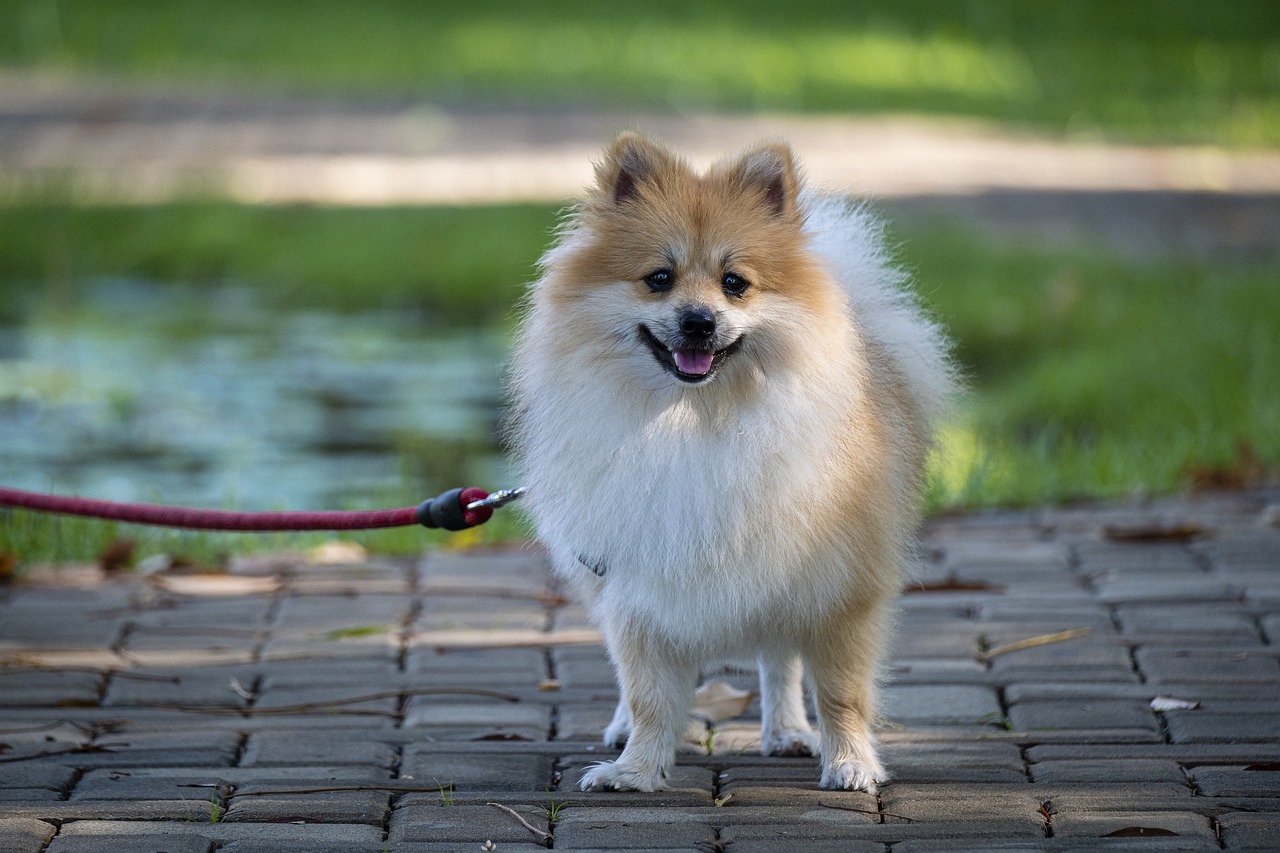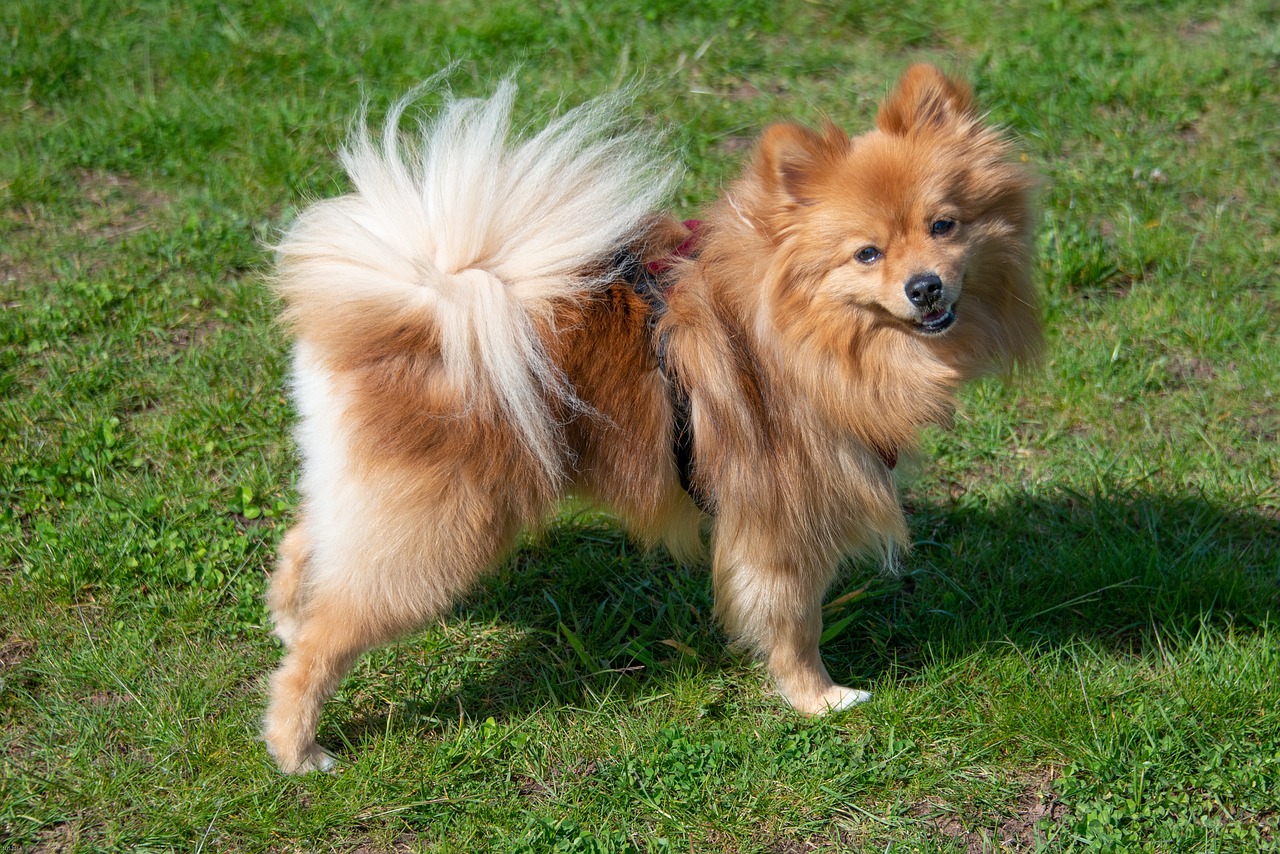Understanding a Pomeranian’s temperament is essential for potential owners of this captivating, fluffy breed. Here, we’ll delve into eight key traits that define the Pomeranian’s unique personality.
1. Intelligent and Alert
Pomeranians are remarkably intelligent and alert. Their sharp minds make them quick learners, which facilitates training, although their intelligence can sometimes lead to stubbornness. The alertness of Pomeranians makes them excellent watchdogs, as they’re quick to sound the alarm at the sign of intruders.
2. Energetic and Playful
Despite their small stature, Pomeranians are brimming with energy and enthusiasm. These dogs are always up for a play session, making them delightful companions for individuals and families alike. However, their energy levels mean they require regular exercise and mental stimulation to prevent boredom.
3. Independent
Pomeranians have an independent spirit, which means they’re content when left alone for reasonable periods. Their independence is complemented by their loyalty to their owners, creating a balanced dynamic in the household.
4. Confident and Bold
Poms are known for their confident and bold demeanor. They often act like they’re much larger than their actual size, approaching life with gusto and fearlessness. While their confidence is endearing, it’s important to monitor their interactions with larger animals to prevent potential conflicts.
5. Loyal and Affectionate
These dogs form strong attachments to their owners, showcasing loyalty and affection. Pomeranians are happiest when they’re with their beloved human companions, although their loyalty can sometimes develop into protective behavior.
6. Vocal
With their alert and watchful nature, Pomeranians tend to be quite vocal. They won’t hesitate to bark when they notice something amiss, which makes them effective guard dogs. However, training is necessary to manage excessive barking.
7. Adaptable
Pomeranians can thrive in various living situations. Whether in a spacious home or a small apartment, they adapt well to their environments as long as their physical and emotional needs are met.
8. Social, Yet Reserved
While Pomeranians are social animals, they can be somewhat reserved or cautious around strangers. Early and consistent socialization is vital to help them become well-adjusted adults.
How Does a Male Pomeranian Temperament Compare to a Female Pomeranian?
Male Pomeranian Temperament:
1. Social and Outgoing
Male Pomeranians tend to be more social and outgoing with both people and other animals. They often display an enthusiastic approach toward life, eagerly participating in play and interactions, making them delightful companions for those seeking an engaging pet.
2. Dominant Tendencies
Despite their diminutive size, male Pomeranians may exhibit dominant behaviors. These might manifest in territorial marking or assertiveness, necessitating early and consistent training to establish proper behavior and hierarchy within the household.
3. Consistency in Affection
Males generally offer consistent affection to their owners. They are loving and dedicated, forming strong bonds with family members, which leads to a rewarding companionship brimming with loyalty and affection.
Female Pomeranian Temperament:
1. Independent Spirit
Females are often more independent than their male counterparts. They might not seek out attention as actively, but they are equally loving and affectionate on their terms. This independence can be advantageous for potential owners who appreciate a pet with a self-sufficient streak.
2. Protective Nature
Female Pomeranians are known to develop a deeply protective instinct towards their owners. They are vigilant and sometimes more reserved with strangers, making them excellent watchdogs that will alert you to any unusual activity or presence.
3. Mood Variations
Female Poms may experience mood fluctuations, especially if they aren’t spayed. Their behavior can change during their heat cycles, making them more sensitive or irritable. Being aware of and accommodating these shifts is crucial for maintaining a harmonious relationship.
Frequently Asked Questions about a Pomeranian‘s Temperament and Personality

- How intelligent are Pomeranians?
- Pomeranians are highly intelligent, making them quick learners who can master various commands and tricks. Their intellect, however, requires mental stimulation to prevent boredom and undesirable behaviors.
- Are Pomeranians good with children?
- While Pomeranians can be affectionate with children, their small size makes them delicate. Supervision is crucial during interactions with young children to prevent accidental injuries to the dog.
- Do Pomeranians get along with other pets?
- With early socialization, Pomeranians can coexist peacefully with other pets. However, their bold and confident demeanor may lead them to challenge larger animals, necessitating careful introductions and monitoring.
- How much exercise do Pomeranians need?
- Despite their energetic nature, Pomeranians don’t require extensive exercise. Short daily walks coupled with play sessions provide sufficient physical activity to keep them healthy and happy.
- Are Pomeranians easy to train?
- While intelligent, Pomeranians possess a strong-willed character, making consistent, positive reinforcement training essential. Early training helps in developing well-behaved and obedient Pomeranians.
- Are Pomeranians loud or yappy?
- Pomeranians are known for their vocal nature. Training them to understand quiet commands is crucial for managing excessive barking.
- How are Pomeranians with strangers?
- Typically, Pomeranians are alert and cautious around strangers, making them excellent watchdogs. Early socialization helps in making them more amiable and less anxious around new people.
- Do Pomeranians have separation anxiety?
- Pomeranians often form strong bonds with their owners, leading to potential separation anxiety. Consistent routines and comfortable, secure environments can mitigate stress when left alone.
- Can Pomeranians live in apartments?
- Their small size and exercise needs make Pomeranians suitable for apartment living, provided they receive adequate mental stimulation and physical activity.
- What’s the life expectancy of a Pomeranian?
- With proper care and a healthy lifestyle, Pomeranians can live between 12 to 16 years.
- Are Pomeranians hypoallergenic?
- Pomeranians are not hypoallergenic, and they do shed. Regular grooming can help manage shedding and reduce allergen levels in the home.
- Do Pomeranians like to cuddle?
- While they are affectionate and enjoy being close to their owners, Pomeranians also value their independence and may not always seek out cuddles.
- Are Pomeranians good for first-time dog owners?
- Their training and grooming needs may pose challenges for first-time owners, but individuals willing to invest time and energy will find rewarding companions in Pomeranians.
- How should I socialize my Pomeranian?
- Early exposure to various environments, people, and pets is essential. Puppy classes and controlled social encounters can facilitate positive social development.
- How much grooming do Pomeranians require?
- Pomeranians have a double coat that requires regular grooming to prevent matting and excessive shedding. Consistent brushing, bathing, and periodic professional grooming sessions are crucial for maintaining their coat’s health and appearance.
What Kind of Person Is a Good Fit for a Pomeranian?
 A Pomeranian can be an enchanting addition to your household with their sprightly and affectionate demeanor. However, they are not a universal fit for all lifestyles. Below are traits and lifestyles that mesh well with the Pomeranian temperament.
A Pomeranian can be an enchanting addition to your household with their sprightly and affectionate demeanor. However, they are not a universal fit for all lifestyles. Below are traits and lifestyles that mesh well with the Pomeranian temperament.
1. Active Individuals or Families
Pomeranians possess a high energy level. If you lead an active life or are willing to engage in regular play and walks, a Pomeranian can be a delightful companion, adding vibrancy and joy to your everyday activities.
2. Experienced Dog Owners
While Pomeranians are intelligent, their strong-willed and independent nature makes them more suitable for individuals who have experience with dogs and understand the nuances of dog training and care.
3. Patient Trainers
Training a Pomeranian requires patience and consistency. Individuals who are committed to providing positive reinforcement training and who have the patience to navigate through their stubborn streaks are ideal owners for this breed.
4. Owners with Time for Grooming
With their luxurious double coat, Pomeranians require regular grooming. If you enjoy the grooming process or are willing to invest time and resources into maintaining your coat’s health and appearance, a Pomeranian will thrive in your care.
5. Families with Older Children or Adults Only
Due to their small size, Pomeranians are delicate and can be easily injured by very young children. Households with older children who understand how to handle dogs gently or adults living alone or together are ideal environments for Pomeranians.
6. Those Seeking a Companion
Pomeranians are known for their loyal and affectionate nature towards their owners. If you seek a pet that will form a close bond with you, offering companionship and unwavering loyalty, a Pomeranian is a prime candidate.
7. Residents of Small Living Spaces
Their small size makes Pomeranians excellent pets for apartment living or homes with limited space. As long as they receive adequate exercise and stimulation, they are content in smaller living environments.
8. Individuals Who Can Provide Socialization
Early and ongoing socialization is crucial for Pomeranians to help them develop into well-adjusted adults. Owners who are proactive in exposing them to various environments, people, and pets will foster a more adaptable and confident Pomeranian.
Pomeranians make captivating companions for the right individuals or families. Whether you are an active individual, an experienced dog owner, or someone seeking a loyal companion, understanding and aligning with the needs and temperament of a Pomeranian can lead to a rewarding and joy-filled relationship with this charming breed.
 Toledo, United States.
Toledo, United States.
